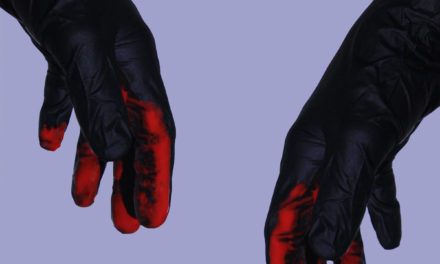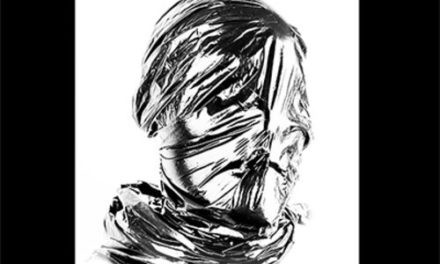Snog
Babes in Consumerland
Metropolis/Product Systems
Anybody who has been paying attention shouldn’t really be surprised by Babes in Consumerland. It’s been more than a decade and a half since Dee Thrussel’s Snog started getting well and truly weird and wonderful on the Morricone influenced Buy Me I’ll Change Your Life, and 10 years since the project put out a full-on folktronica record in the form of Beyond the Valley of the Proles, the early EBM recordings (good as they are) aren’t even visible with a telescope from 2013. Thrussel has been developing this sound —a WTF amalgation of protest folk, electropop, and industrial – for a long-ass time now, and the new LP has a lot more in common with the last two (2007’s The Last Days of Rome and 2010’s Last of the Great Romantics) than any of the preceding albums had with one another. This is pretty much as definitive a record of what Snog sounds like as you’re likely to get. That’s not a bad thing really, as anyone put off by the evolution of the project is unlikely to have held on this long, the audience for Snog at this point should be well-aware of what they’re getting into on a new album.
Even the promotional materials for the record seem a little confused on how to push an album from a formerly mercurial artist who has since settled into a specific mode of creation, however offbeat; besides a reference to this being the first album where Thrussel has explicitly identified as a transgendered woman, and a winking reference to Snog now being an all-girl band, it’s mostly a lot of talk about how subversive they are. I might make the argument that for music to be truly subversive it has to be marketed to an non-niche audience that might be unsympathetic to its message, but that’d be a digression. The important thing is that Thrussel is still singing about the same stuff she always has, namely the dangers of conformity, corporate antipathy and our culture’s race towards total dehumanization and ruin. The overall effect is that the project has finally reached a point where it’s as consistent musically as it always has been lyrically, in terms of palette if not actual composition at any rate.
Still, the feeling of Babes in Consumerland as “Snog doing Snog” is hard to shake at first, especially in light of the first couple of tracks. “The Plug-In Drug” is the sort of lilting, mournful, slow-grooving song Thrussel has exceled at for a minute now, a not-so-distant cousin to catalogue tracks like “This is Capitalism” or “City”, with the plod of kick-snare drums and rounded 16th-note bass carrying it (and by extension of its lyrical conceit regarding our complete, childlike dependence on technology for stimulation, us) closer to the metaphorical grave. It’s an odd choice for an opener, but one that makes sense when it’s followed so closely by the faux-sunshine of the deeply cynical “Everything is Under Control”, the two tracks setting up poles of mood for the rest of the album to bounce between. When I reviewed the track a few weeks ago I said it felt a bit slight, a fun tune but not necessarily single material, a position I have since revised based on its insidious catchiness, with Thrussell delivering purple couplets like “Fated outdated political class/the wilted proletarians take it in the ass” with enough sugar to make them go down sweetly.
That sort of straightfaced wink-nudge is Snog’s stock in trade, and acts as a thread through each of the band’s releases, a trick so instinctual to Thrussell that it becomes utilitarian, acting as camouflage, smoke signal, or pointed stick depending on the context. “The New Cocksucker Blues” comes off as pretty on-the-nose at a glance, but the question of whether we as the listener have *ahem* sucked some cock today becomes weirdly transcendent as it’s repeated again and again, the song’s profane tirade of corporate crimes backed by organ vamps and glistening synth pads. Hell, the main lyrical hook of “Soul Invictus”, that “The internet will not save your life” could have been lifted from a mediocre Sunday church sermon, but Dee delivers it with such unabashed conviction you’re forced to examine where it lies in the spectrum that includes satire and the genuine (I propose we call this “the Laibach effect”).
What all the tracks I’ve mentioned so far have in common musically is a somewhat languid feel, but Babes in Consumerland progresses in movements, and it’s in the second one just past the opening tracks that some of the meatiest moments occur. The trifecta of “Adolph’s Library”, “Bleak is My Favourite Chic” and “Otto Rahn” all revolve around a center of fuzzy rock, less aggressive but not totally removed from Vs. The Faecal Juggernaut Of Mass Culture standout “Planet of Shit”. Grouped together the songs play off one another handily, “Bleak” being by far the most outright rave-up, while “Adolph” and “Otto” each ascend into spacey prog territory before coming back to Earth in more or less one piece, held together during re-entry by the electronics that serve as the skeleton of their arrangements. Having them finish off Side A seem like a gambit destined to make the record feel anti-climactic, but they clear away the brush handily for the back-half to take shape. Thrussell’s penchant for re-recording her own songs and releasing expansive remix singles might give you a contrary impression, but she’s an album artist and is intimately familiar with how to construct them for maximum effect.
And that’s really the lasting impression I get from Babes in Consumerland, that it’s a record that explicitly exists in a continuum with the records that preceded it, and the enjoyment of it has as much to do with how much affection we’ve already developed for the artist that made it as the actual quality of the songs. It’s not a bad creative position to be in for an artist, especially one with a sizeable amount of work to their name; you can continue to follow your muse as unabashedly as you’d like, and the fans who have stuck with you are inclined to look for the good in it rather than pick it apart or compare it unfavourably to what came before. I’d never suggest that Snog isn’t writing good songs anymore, by way of example closer “Apocalypse Fatigue” is as lovely as anything that Thrussell has ever done, a moment of clarion sincerity that cuts through her sweet cynicism with a lovely piano figure and the moving use of a choir in it’s closing moments. What I’m saying is that how we feel about a Snog album is really an indication of how we feel about Snog as an institution. I’m happy to have them, and happy for another record to add to their legacy and as a proxy in my relationship with them. Recommended.







Album of the year.
Smart, sassy synth-pop beast with barbed lyrics of wonder.
*****